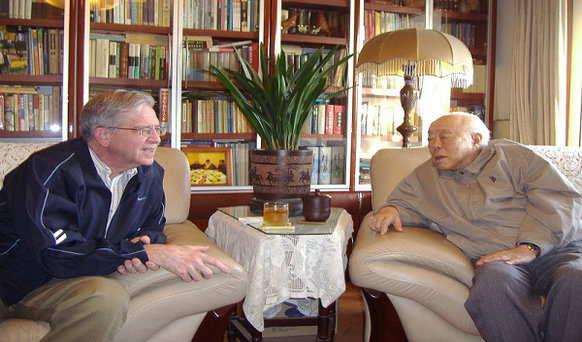Richard Strom Won the International Science and Technology Cooperation Award 2020
At the National Science and Technology Awards Conference held at the Great Hall of the People in Beijing on November 3, 2021, Prof. Richard Strom, a long-term collaborator of National Astronomical Observatories of Chinese Academy of Sciences (NAOC), won the International Science and Technology Cooperation Award (the ISTC Award), which is the nation's highest honor in science for foreign individuals and institutions. The ISTC Award was offered to eight scientists from seven countries in 2020 round. In total, there are 264 projects, 10 science & technology experts, and 1 international organization awarded for the National State Science and Technology Prizes 2020.
Prof. Richard Strom is a senior researcher at the Netherlands Institute for Radio Astronomy (ASTRON). He has made important contributions to the study of giant radio galaxies, supernova remnants, pulsars and gamma bursts, as well as the development of radio astronomy equipment.
Prof. Strom has engaged in scientific and technological cooperation with NAOC for about 30 years, and he is the only foreign expert who has participated in the Five-hundred-meter Aperture Spherical radio Telescope (FAST) project from its very beginning. Since 1994, he has brought the portable equipment from the Netherlands to participate in the FAST site selection, co-authored the first FAST science paper, attended the FAST project international review as an expert, served as the chair of the international evaluation team for the FAST cable fatigue design, and involved in the research and development of the FAST key technologies. He has provided tremendous supports and contributions for the initiation, pre-research, project approval and construction of the FAST project, playing an important role in the leap-forward development of radio astronomy in China.
He was jointly responsible for signing and implementation of the bilateral agreement in science and technology between China and the Netherlands, and assisting China in joining the European Very Long Baseline Interference Network (EVN) as well as the Square Kilometer Array (SKA) project. He was also actively involved in the study of ancient Chinese astronomy, innovating the research methods of ancient supernovae and sun-grazing comets. He visited almost all astronomical observatories and related universities in China, delivered a series of academic lectures and popular science reports, accepted young Chinese scholars to study in the Netherlands, and made outstanding contributions to the development of the astronomical team in China.
Prof. Strom won the International Science and Technology Cooperation Award of CAS in 2019, and was selected as the Distinguished Scientist of the CAS President's International Fellowship Initiative(PIFI).

Photo: Prof. Richard Strom with Sir WANG ShouGuan in 2011 in Beijing. (Credit: NAOC)